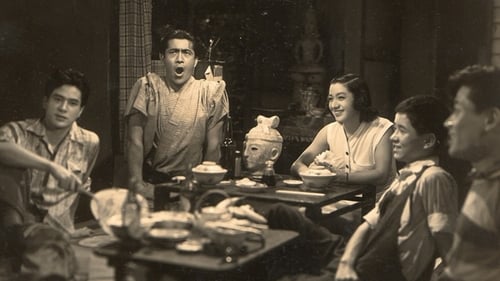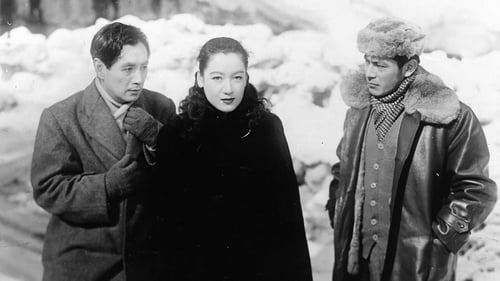
Music
A 3D Japanese short film based on Toho Planning, Studio Jump, and Yomiko Advertising's 1988 television series of the same name. It was produced for the "Jump Out! Super Heroes" event at the Takarazuka Family Land theme park, where it premiered on the day of the event's opening on March 18, 1989.[1] The film is not known to have been released again until almost a full decade later in 1998, when it was included as a bonus feature on the second volume of the series' LaserDisc releases. It has since been carried over to Toho's subsequent video releases, including the second volume of their 2005 DVDs, and the fourth volume of the discs' 2018 Toho Masterpiece Selection reissues.

The 22nd film in the Shacho comedy series.

The story is of two people. One is deaf, the other deaf and mute. They marry after meeting at a school reunion, and the film follows their trials and tribulations ... and joys.

An Ishiro Honda film.

Yamazaki

The president learns that the company's biggest stockholder is also a friend of his singing teacher and spies on his movements.

Masa-don
A young girl moves to Tokyo and endures the rivalries between other high school girls of varying cultural and economic backgrounds.

A new third-class president wins an appointment thanks to his marriage with the former president's daughter.

The tragedy of the geiko girl Ume and the men who try to pursue her.

Kosuke
An Ishiro Honda film.

Daisuke
1953 jidaigeki directed by Nobuo Nakagawa of Jigoku and Ghost of Yotsuya fame.

Setsuko's brother
Young Setsuko Fujino begins a new job at Tokyo Chemical Company. She likes her boss, Ippei Hitachi, and enjoys serving him tea, despite the fact that her fellow workers think the women employees should not have to act in such a servile manner. When the women go on strike over the issue, Setsuko finds herself caught in the middle. When the heir to the company, Ryosuke Tanabe, proposes marriage to Setsuko, she is honored, but realizes that her real affection is for Hitachi.

A married couple looking for an apartment move in with the husband's co-worker, a widower. The husband becomes jealous of the widower and his wife.

Dai
Following the Second World War, the lives of various people in a poverty-stricken area of Tokyo are entertwined. Pachinko parlor girls, shoeshine boys, a maker of costume jewelry, and a streetcorner artist all struggle to make their livings and to find happiness in difficult surroundings.

1950s Japanese comedy.

Once an average and seemingly ordinary Tokyo girl, she suddenly finds herself as a TV star owing to her discovery by a casting company, which noticed photographs that her cousin had sent. When another actress falls ill she is given the role instead. Her first film is a success propelling the young actress to popularity, her own fans, money and a house. While everything looks dandy from the outside not all is well within the family however.

Daisuke

In a small town, according to the homecoming of Professor Ishinaka, the youth culture group was overwhelmed to make a presentation for the summer festival, but because of lack of funds, she works part-time at the spectacle of a tour, a haunted house Especially. The ghost was a struggle amongst the people, it was a great success in filling the crowd, but in the circus hut next to it, Kenji who was supposed to have disappeared was pitiful.

Kaoru
Adaptación de la novela homónima de Dostoievski. Kameda, condenado a muerte por crímenes de guerra, en el último momento se salva de ser fusilado. La conmoción le provoca durante cierto tiempo fuertes ataques epilépticos; pero, al mismo tiempo, también se produce en él una profunda transformación, que algunos llaman "idiotez", pero que no es más que sencillez, bondad y una gran capacidad de amar.

Adaptation of a novel by Yojiro Ishizaka, originally released in two parts.










